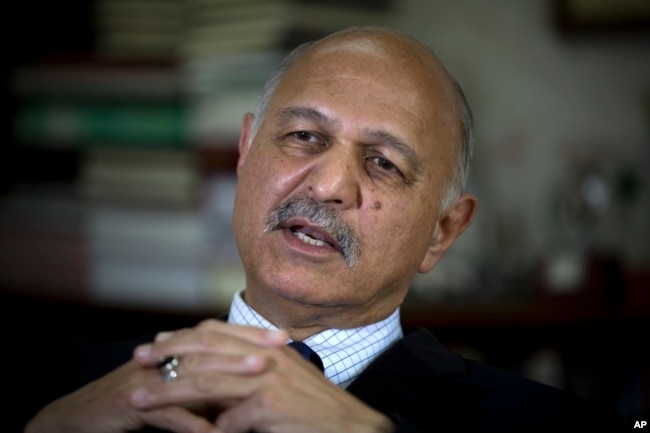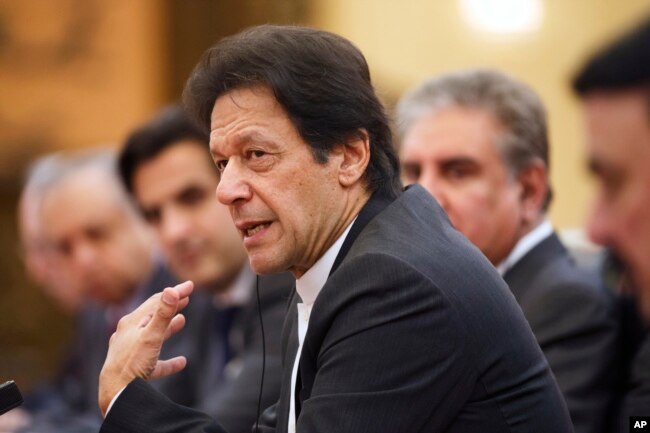China is promising about $3.5 billion to help bolster Pakistan’s dwindling foreign cash reserves and pay for socio-economic development plans undertaken by the country’s new government, VOA news reports.
Beijing will soon deposit $2.5 billion in the State Bank of Pakistan (SBP), raising to $4.5 billion the total amount in commercial loans China has given Pakistan this fiscal year, officials and diplomatic sources confirmed.
Officials say the Chinese government has also promised a grant of $1 billion for education, health, vocational training, drinking water and poverty alleviation projects over the next three years.
Minister for Planning, Development and Reform Makhdum Khusro Bakhtyar said Chinese experts are due to arrive in Islamabad later this month to coordinate socio-economic development under the promised grant.
Pakistan’s foreign currency exchange remains under severe pressure, despite receiving around $2 billion from China and $4 billion from Saudi Arabia and the United Arab Emirates in commercial loan deposits.
SBP reserves stood at $8.2 billion last week, barely enough to cover two months’ worth of imports.
China’s CPEC
In the last six years, China has made significant financial contributions to direct investment, soft loans and commercial deposits to help its close ally, Pakistan, overcome severe economic challenges.
Under its Belt and Road Initiative, Beijing has invested $19 billion in Pakistan to build and improve road infrastructure and power plants and opened the strategic Arabian Sea port of Gwadar. Beijing has also given Islamabad concessional loans for some projects under what is known as the China-Pakistan Economic Corridor (CPEC).
The cooperation deal has created more than 70,000 jobs for Pakistanis and quickly resolved the country’s chronic energy crisis. But investments from China had stopped because all major projects under CPEC will be complete by the end of this year.
Chinese and Pakistani officials say preparations are under way to launch the next phase of CPEC in coming weeks to construct nine special economic zones across Pakistan.
Beijing plans to relocate some of its industries by transferring technology to the new industrial zones to help Islamabad increase its exports to overcome its massive trade deficit and shore up cash reserves.
CPEC has “changed the image of Pakistan” and encouraged other countries to invest in the country, notes veteran opposition Senator Mushahid Hussain, who chairs the foreign affairs committee of the upper house of parliament. He praised China for being the only country to bring unprecedented, massive investments to Pakistan five years ago when other nations were reluctant to do so due to terrorism-related security concerns and political considerations.
“Before CPEC, people were talking of a failing state, of problems of Pakistan. Today, Pakistan is part of the solution to key regional problems [including Afghanistan] and Pakistan’s image is that of an investor-friendly, tourism-friendly destination,” Mushahid said.
China believes a stable and strong Pakistan is in the interest of China, said Yao Jing, Chinese ambassador to Islamabad. “China would like to align the development strategies of both countries and support development of Pakistan,” he wrote in a recent article.
Khan’s reform agenda
Prime Minister Imran Khan’s nascent government has embarked on a major economic reform agenda to revive the country’s crisis-ridden economy and attract much-needed foreign direct investment.
Khan has defended what he admits are “painful reforms,” saying Pakistan’s financial woes could not be addressed without taking tough, long-overdue measures. He blames alleged mismanagement and corruption by his predecessors for the ailing state of the economy. The government has increased duties on luxury imports, significantly devalued the currency to encourage exports, and raised prices of utility services, particularly natural gas, to generate more revenue.
Officials defend their arrangement of emergency loans from Pakistan’s friendly countries, saying they are intended mainly to secure a breathing space for macroeconomic stabilization measures to take root and create a business-friendly environment.
Saudi Crown Prince to visit
In addition to lending urgent cash deposits of $3 billion each at an interest rate of about 3 percent, both Riyadh and Abu Dhabi have also allowed Islamabad to defer $6 billion in oil import payments for one year.
Pakistani officials say the Saudi government has already disbursed $3 billion and the process for $3 billion in deferred oil payments have been finalized. An agreement is expected to be signed when Saudi Crown Prince Mohammad bin Salman visits Islamabad Saturday.
The prince is expected to announce projects worth up to $20 billion during his first state visit, Pakistani investment minister Haroon Sharif told VOA this week. The projects include a massive oil refinery in Gwadar with an estimated investment of around $10 billion.
The UAE is working to establish an oil refinery in Pakistan and plans investments in other sectors. Malaysia, Qatar and South Korea are among other countries anxious to invest in Pakistan, officials said.




